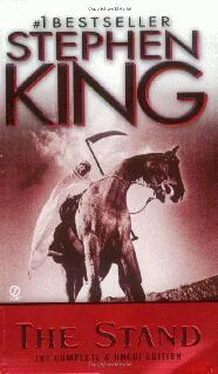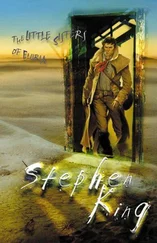“ We put the mopheads downstairs! ” his mother cried out. Thunder rolled. “ Those Puerto Rickies don’t know nothing! ”
“—call will be taken as soon as—”
He thumped the phone down and stood over it, sweating. What kind of goddam hospital was that, where you got a fucking recorded announcement when your mother was dying? What was going on there?
Larry decided to go down and see if Mr. Freeman could watch her while he got over to the hospital. Or should he call a private ambulance? Christ, how come nobody knew about these things when they needed to know about them? Why didn’t they teach it in school?
In the bedroom his mother’s laborious breathing went on and on.
“I’ll be back,” he muttered, and went to the door. He was scared, terrified for her, but underneath another voice was saying things like: These things always happen to me . And: Why did it have to happen after I got the good news? And most despicable of all: How bad is this going to screw up my plans? How many things am I going to have to change around?
He hated that voice, wished it would die a quick, nasty death, but it just went on and on.
He ran down the stairs to Mr. Freeman’s apartment and thunder boomed through the dark clouds. As he reached the first-floor landing the door blew open and a curtain of rain swept in.
The Harborside was the oldest hotel in Ogunquit. The view was not so good since they had built the new yacht club over on the other side, but on an afternoon like this, when the sky had been poxed with intermittent thunderstorms, the view was good enough.
Frannie had been sitting by the window for almost three hours, trying to write a letter to Grace Duggan, a high school chum who was now going to Smith. It wasn’t a confessional letter dealing with her pregnancy or the scene with her mother—writing about those things would do nothing but depress her, and she supposed Grace would hear soon enough from her own sources in town. She had only been trying to write a friendly letter. The bicycle trip Jesse and I took to Rangely in May with Sam Lothrop and Sally Wenscelas. The biology final I lucked out on. Peggy Tate’s (another high school friend and mutual acquaintance) new job as a Senate page. The impending marriage of Amy Lauder.
The letter just wouldn’t allow itself to be written. The interesting pyrotechnics of the day had played a part—how could you write while pocket thunderstorms kept coming and going over the water? More to the point, none of the news in the letter seemed precisely honest. It had twisted slightly, like a knife in the hand that gives you a superficial cut instead of peeling the potato as you had expected it to do. The bicycle trip had been jolly, but she and Jess were no longer on such jolly terms. She had indeed lucked out on her BY-7 final, but had not been lucky at all on the biology final that really counted. Neither she nor Grace had ever cared all that much for Peggy Tate, and Amy’s forthcoming nuptials, in Fran’s present state, seemed more like one of those ghastly sick jokes than an occasion of joy. Amy’s getting married but I’m having the baby, hah-hah-hah.
Feeling that the letter had to be finished if only so she wouldn’t have to wrestle with it anymore, she wrote:
I’ve got problems of my own, boy do I have problems, but I just don’t have the heart to write them all down. Bad enough just having to think about them! But I expect to see you by the Fourth, unless your plans have changed since your last letter. (One letter in six weeks? I was beginning to think someone had chopped your typing fingers off, kid!) When I see you I’ll tell you all. I could sure use your advice.
Believe in me and I’ll believe in you,
Fran
She signed her name with her customary flamboyant/comic scrawl, so it took up half of the remaining white space on the notesheet. Just doing that made her feel more like an imposter than ever. She folded it into the envelope and addressed it and put it against the mirror standing up. Finished business.
There. Now what?
The day was darkening again. She got up and walked restlessly around the room, thinking she ought to go out before it started to rain again, but where was there to go? A movie? She’d seen the only one in town. With Jesse. To Portland to look at clothes? No fun. The only clothes she could look at realistically these days were the ones with the elastic waistbands. Room for two.
She’d had three calls today, the first one good news, the second indifferent, the third bad. She wished they’d come in reverse order. Outside the rain had begun to fall, darkening the marina’s pier again. She decided she’d go out and walk and to hell with the impending rain. The fresh air, the summer damp, might make her feel better. She might even stop somewhere and have a glass of beer. Happiness in a bottle. Equilibrium, anyway.
The first call had been from Debbie Smith, in Somersworth. Fran was more than welcome, Debbie said warmly. In fact, she was needed. One of the three girls who had been sharing the apartment had moved out in May, had gotten a job in a warehousing firm as a secretary. She and Rhoda couldn’t swing the rent much longer without a third. “And we both come from big families,” Debbie said. “Crying babies don’t bother us.”
Fran said she’d be ready to move in by the first of July, and when she hung up she found warm tears coursing down her cheeks. Relief tears. If she could get away from this town where she had grown up, she thought she would be all right. Away from her mother, away from her father, even. The fact of the baby and her singleness would then assume some sort of sane proportion in her life. A large factor, surely, but not the only one. There was some sort of animal, a bug or a frog, she thought, that swelled up to twice its normal size when it felt threatened. The predator, in theory at least, saw this, got scared, and slunk off. She felt a little like that bug, and it was this whole town, the total environment ( gestalt was maybe an even better word), that made her feel that way. She knew that nobody was going to make her wear a scarlet letter, but she also knew that for her mind to finish convincing her nerves of that fact, a break with Ogunquit was necessary. When she went out on the street she could feel people, not looking at her, but getting ready to look at her. The year-round residents, of course, not the summer people. The year-round residents always had to have someone to look at—a tosspot, a welfare slacker, The Kid from a Good Family who had been picked up shoplifting in Portland or Old Orchard Beach… or the girl with the levitating belly.
The second call, the so-so one, had been from Jess Rider. He had called from Portland and he had tried the house first. Luckily, he had gotten Peter, who gave him Fran’s telephone number at the Harborside with no editorial comment.
Still, almost the first thing he’d said was: “You got a lot of static at home, huh?”
“Well, I got some,” she said cautiously, not wanting to go into it. That would make them conspirators of a kind.
“Your mother?”
“Why do you say that?”
“She looks like the type that might freak out. It’s something in the eyes, Frannie. It says if you shoot my sacred cows, I’ll shoot yours.”
She was silent.
“I’m sorry. I don’t want to offend you.”
“You didn’t,” she said. His description was actually quite apt—surface-apt anyway—but she was still trying to get over the surprise of that verb, offend . It was a strange word to hear from him. Maybe there’s a postulate here, she thought. When your lover begins to talk about “offending” you, he’s not your lover anymore.
Читать дальше












